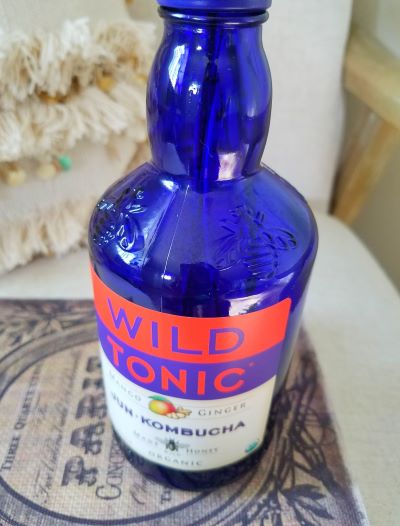If I’m being honest, I will likely try anything once, but more than likely I’ll give anything the benefit of the doubt and try it a few times, which was the case with Kombucha. The first two times I was completely turned off and could care less about the numerous health benefits that came with drinking Kombucha, I resolved to find other ways to get them before I spent my coin on it.
Well, fast forward a year or two when I was invited to a yoga event that had a few local vendors onsite with samples–every medical student’s dream. Wild Tonic was among the vendors and as you can imagine I was a bit reluctant–but it was free, so the rep easily convinced me to try it stating that Wild Tonic Jun Kombucha was different. Now, I’m intrigued right, wondering how are they different? What sets them apart from the competition or lack thereof for me? I took a sip and I was sold! Now, let’s get into it.
How is Wild Tonic different?
For starters, Traditional Kombucha ferments tea–usually green or black, with cane sugar while Wild Tonic produces a Jun Kombucha which is fermented with green tea and honey instead of sugar. I later found out that this is the main reason why I prefer Jun Kombucha to traditional Kombucha. Wild Tonic Jun Kombucha is smooth with a subtle sweetness and extremely refreshing. Wild Tonic does not have that sour, vinegar sting with every sip which is why I can get down with it.
What sets Wild Tonic apart?
They pride themselves on using ethically and sustainably sourced organic tea. Wild Tonic uses USDA-certified organic fruit, and organic herbs and spices.

Their unmistakable cobalt blue glass bottle pays homage to bees. As I did more research on this topic, I found out that bees “see blue spectrum colors best,” therefore, increasing the chance of pollination for that particular flower.² Wild Tonic makes it a priority to support local farmers and beekeeping conservations. They recognize the important role that bees play in their business and strive to educate the community on ways to support bee conservation.

Wild Tonic is an environmentally conscious company, you can reuse and recycle their glass bottles. They also utilize composting, and even biodegradable and non-toxic cleaning products. Maintaining an eco-friendly environment and sustainable products definitely seems to be a big part of this company’s mission.
3 Benefits of Kombucha
- Antioxidant: Antioxidants remove free radicals. But, what are free radicals? Free radicals are unstable and highly reactive molecular species that damage cells leading to signs of aging.³
- Antimicrobial: Honey’s antimicrobial activity has been widely studied. Honey is used in many countries for its antimicrobial and antibacterial effects when treating various conditions and topical infections. Today, honey continues to be a substance of interest when it comes to disease and wound healing.¹ᐩ⁴
- Antifungal: It is thought that the presence of acetic acid due to the fermentation process of Kombucha contributes to the antifungal activity.⁵
*Disclosure: Links included in this blog post might be affiliate links. If you purchase a product or service with the links that I provide, I may receive a small commission. There is no additional charge to you! Thank you for supporting my platform so I can continue to provide you with free content each month.
Resources
- Albaridi NA. Antibacterial Potency of Honey. International Journal of Microbiology. https://www.hindawi.com/journals/ijmicro/2019/2464507/. Published June 2019.
- Bee Mission. The Secret Reason Bees Love Blue and Purple Flowers. Bee Mission. https://beemission.com/blogs/news/the-secret-reason-bees-love-blue-and-purple-flower. Published October 2019.
- Lobo V, Patil A, Phatak A, Chandra N. Free radicals, antioxidants and functional foods: Impact on human health. Pharmacognosy reviews. https://www.ncbi.nlm.nih.gov/pmc/articles/PMC3249911/. Published July 2010.
- Mandal MD, Mandal S. Honey: its medicinal property and antibacterial activity. Asian Pacific journal of tropical biomedicine. https://www.ncbi.nlm.nih.gov/pmc/articles/PMC3609166/. Published April 2011.
- Mousavi SM, Hashemi SA, Zarei M, et al. Recent Progress in Chemical Composition, Production, and Pharmaceutical Effects of Kombucha Beverage: A Complementary and Alternative Medicine. Evidence-based complementary and alternative medicine : eCAM. https://www.ncbi.nlm.nih.gov/pmc/articles/PMC7688354/. Published November 2020.

